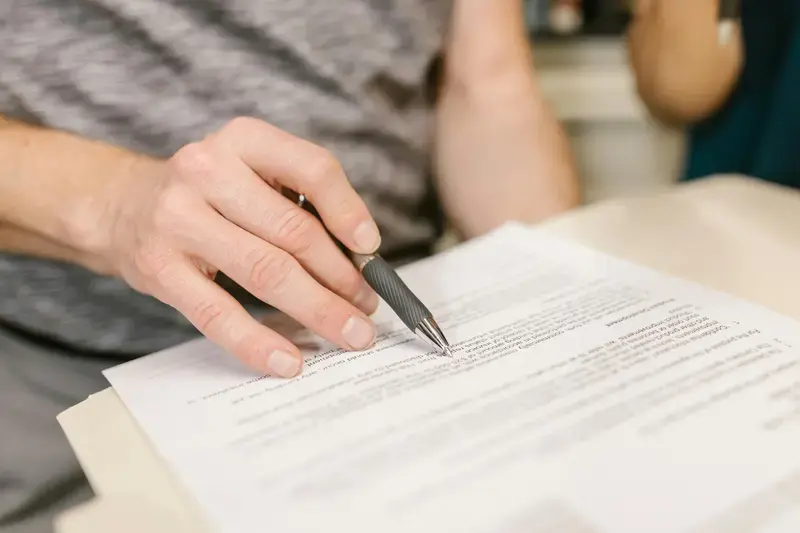What Should Be In My App Development Contract?
Nearly 70% of app development projects end up in some form of dispute, and most of these could have been avoided with a proper contract. That's a staggering number when you think about it—and it shows just how many people dive into app development without the right legal protection in place. After working with hundreds of clients over the years, I can tell you that the ones who invest time in getting their app development contract essentials sorted from the start are the ones who sleep better at night.
Building a mobile app isn't like buying something off the shelf. You're entering into a partnership that could last months or even years, involving your money, your ideas, and often your business's future. Without clear mobile app legal protection, you're basically crossing your fingers and hoping nothing goes wrong. And trust me, things can go very wrong very quickly.
A good contract isn't about not trusting your developer—it's about making sure everyone knows exactly what they're signing up for
The thing is, most people focus on finding the right developer but spend barely any time thinking about the app developer agreement terms that will govern their relationship. This guide will walk you through everything you need to know to protect yourself, your investment, and your app idea. Because getting this right from the beginning can save you thousands of pounds and months of headaches down the line.
Understanding Project Scope and Deliverables
Getting the project scope right in your app development contract is probably one of the most important things you'll do—and I've seen plenty of projects go sideways because this bit wasn't clear enough. The scope section needs to spell out exactly what your development team will build, what features will be included, and what won't be part of the initial project.
What Gets Built
Your contract should list every major feature and function your app will have. I'm talking about user registration, payment systems, push notifications, social media integration—whatever applies to your project. Don't just say "build a social media app" because that could mean anything from a simple photo-sharing tool to the next Facebook.
The deliverables section should cover more than just the app itself. You'll want to know if you're getting the source code, design files, documentation, app store submissions, and any backend systems. Some agencies include user manuals or training sessions; others charge extra for these. Understanding what an app developer needs from you can help clarify which deliverables are most important for your specific project.
What Doesn't Get Built
Just as important is being clear about what's not included. Third-party integrations, complex admin panels, or advanced analytics might be out of scope. Having this in writing prevents those awkward conversations later when you assumed something was included but your development team didn't.
Payment Terms and Milestones
Getting paid properly and on time is something every app developer worries about—and frankly, clients should worry about it too. A well-structured payment schedule protects both sides and keeps your project moving smoothly. I've seen too many projects grind to a halt because payment terms weren't clear from the start.
Most app development contracts use milestone-based payments rather than one big lump sum at the end. This makes sense for everyone involved. You might pay 25% upfront, then another 25% when wireframes are approved, 25% when development is complete, and the final 25% after testing and launch. The exact percentages can vary, but the principle remains the same—payments tied to completed work.
What Happens When Milestones Are Missed?
Your contract should spell out what happens if deadlines slip or work doesn't meet the agreed standards. Will payments be delayed? Can either party pause the project? These aren't pleasant conversations to have, but they're much easier when everything's written down beforehand.
Never agree to pay 100% upfront for app development work. Legitimate developers will always work with milestone-based payments that protect both parties throughout the project.
Late Payment Penalties
Many developers include late payment fees in their contracts—typically 1-2% per month on overdue amounts. This might seem harsh, but it keeps projects on track and covers the developer's costs when cash flow is disrupted.
Timeline and Development Phases
Getting the timeline right in your app development contract can make or break your project—I've seen too many apps launch months late because nobody bothered to nail down proper phases upfront. Your contract needs to spell out exactly what happens when, and trust me, this isn't just about picking random dates from a calendar.
Most app projects follow a predictable pattern, and your contract should reflect this reality. You'll typically see discovery and planning phases first, followed by design, development, testing, and launch. Each phase should have clear start and end dates, but here's the thing—they also need realistic buffer time built in.
Breaking Down Development Phases
Your contract should outline each phase with specific deliverables and timeframes. Here's what I typically include:
- Discovery and requirements gathering (2-3 weeks)
- UI/UX design and prototyping (3-4 weeks)
- Backend development and API creation (4-6 weeks)
- Frontend development and integration (4-8 weeks)
- Testing and quality assurance (2-3 weeks)
- App store submission and launch (1-2 weeks)
Managing Timeline Delays
Here's something most people don't think about—what happens when things go wrong? Your contract needs clauses covering delays caused by both parties. If the client takes three weeks to approve designs instead of one, the whole timeline shifts. Make sure your contract addresses how these delays get handled and who bears the cost.
Intellectual Property Rights
I've worked on hundreds of app development projects over the years, and I can tell you that intellectual property rights cause more headaches than any other contract section. Here's the thing—if you don't get this bit right, you might end up paying for an app you don't actually own. Yes, that's a real possibility and it happens more often than you'd think.
Your app development contract needs to clearly state who owns what once the project is finished. This includes the source code, design assets, graphics, logos, and any custom features built specifically for your app. Most clients assume they'll automatically own everything they've paid for, but that's not always the case unless it's written down properly.
Code Ownership vs Licensing
Some developers prefer to license their work rather than transfer full ownership—this means you can use the app but they retain certain rights. Others will transfer complete ownership once final payment is made. Both approaches work, but you need to know which one you're getting.
The biggest mistake I see is clients assuming ownership without checking their contract properly—don't let this be you
Make sure your contract covers third-party components too. Most apps use existing libraries and frameworks, and these come with their own licensing terms that need to be respected in your app development agreement terms.
Protecting Your Original Ideas
Your contract should include confidentiality clauses that prevent your developer from sharing your app concept with competitors or building similar apps for other clients. This is particularly important if your app involves a unique business model or innovative features that give you a competitive edge.
Consider who owns any improvements or modifications made during development. If your developer suggests a brilliant new feature while building your app, who owns that intellectual property? These details might seem minor now, but they can become major issues later if your app becomes successful.
Testing and Quality Assurance Requirements
I'll be honest with you—testing is where many app development contracts fall short, and that's where things can get messy later on. You need to know exactly what kind of testing your development team will do before they hand over your app. Will they test it on different devices? What about different operating system versions? These details matter more than you might think.
Your contract should spell out the specific types of testing that will happen. This includes functional testing (making sure everything works as expected), performance testing (checking the app doesn't crash or run slowly), and compatibility testing across different devices and screen sizes. Don't assume this is all included—I've seen too many clients surprised when their app doesn't work properly on older phones.
What Testing Should Be Included
- Functional testing on core features and user journeys
- Performance testing under different usage conditions
- Device compatibility testing across popular models
- Operating system version compatibility checks
- Security testing for data protection
- User acceptance testing procedures
The contract should also define what happens when bugs are found. Who fixes them? How quickly? What counts as a critical bug versus a minor issue? Getting these details sorted upfront will save you headaches and potentially extra costs down the line. Make sure your contract addresses features that users actually want to avoid wasting time testing functionality that nobody will use.
Bug Fix Responsibilities
Your contract needs to define different categories of issues and how quickly each should be resolved. A security vulnerability needs immediate attention, while a minor visual glitch can wait. Most good contracts establish response times—critical bugs within 24 hours, standard bugs within a week, and cosmetic issues within two weeks.
Make sure you understand what happens if bugs appear after the testing phase. Some developers include unlimited bug fixes during development but charge for issues discovered after final delivery. Others offer a grace period where all legitimate bugs get fixed free of charge.
Post-Launch Support and Maintenance
Here's something that catches many people off guard—your app doesn't magically maintain itself once it's live in the app stores. I've seen too many clients assume that once their app launches, the developer's job is done. Wrong! Your app development contract needs to spell out exactly what happens after launch day.
Most app development contracts should include a warranty period—typically 30 to 90 days—where the developer fixes any bugs or issues that pop up without charging extra. This isn't about adding new features; it's about making sure everything works as promised. Beyond that warranty period, you'll want to discuss ongoing maintenance terms. Will your developer handle app store updates when Apple or Google change their requirements? What about compatibility updates for new phone models?
Defining Support Boundaries
Be crystal clear about what counts as maintenance versus new development. Fixing a broken login button? That's maintenance. Adding a whole new user registration system? That's new development and should be charged separately. Your contract should outline response times for different types of issues—a crashed app needs fixing faster than a minor visual glitch.
Always negotiate a reasonable support period in your app development contract essentials—even 30 days of post-launch support can save you thousands in emergency fixes from another developer who doesn't know your app's code.
Long-term Maintenance Planning
Your contract should address what happens when Apple or Google release new operating system versions that might break your app. These updates happen every year, and apps need adjusting to stay compatible. Some developers include the first year of OS compatibility updates; others charge separately for each update.
Think about server maintenance if your app uses backend services. Understanding how to protect your highest value data becomes crucial when planning ongoing maintenance responsibilities. Who monitors server performance? Who handles security updates? What happens if your app suddenly gets thousands of new users and the servers can't cope? These scenarios need planning before they become emergencies.
Legal Protection and Dispute Resolution
Let's be honest—nobody wants to think about what happens when things go wrong. I've been in this business long enough to know that most app development projects run smoothly, but the ones that don't can get messy quickly. That's why your contract needs solid legal protection and a clear plan for resolving disputes.
Governing Law and Jurisdiction
Your contract should specify which country's laws apply and where any legal disputes will be handled. If you're based in the UK and your developer is in another country, you'll want to agree upfront whether disputes get resolved in British courts or elsewhere. This might seem like legal jargon, but trust me—it matters when you're facing a real problem.
Dispute Resolution Process
Smart contracts include a step-by-step process for handling disagreements before they escalate to expensive legal action. Here's what I recommend including:
- Direct negotiation between both parties first
- Mediation with a neutral third party if negotiation fails
- Arbitration as a faster alternative to court proceedings
- Legal action as the final resort
You'll also want liability caps that limit how much each party can claim in damages. This protects both you and your developer from potentially devastating financial consequences if something goes seriously wrong with the project. Consider looking into what makes apps truly successful to ensure your contract focuses on building quality rather than just meeting minimum requirements.
Termination Clauses
Your contract needs clear terms about what happens if either party wants to end the project early. Can you terminate for convenience, or only for cause? What about the developer—can they walk away if payments are consistently late? Make sure you understand what work products you'll receive if the project ends prematurely and what payments might still be owed.
Include provisions for what happens to your data and source code if the relationship ends badly. You don't want to be locked out of your own app because of a contract dispute. The agreement should guarantee you'll receive all completed work and source code even if the project terminates early.
Confidentiality and Non-Disclosure
Your app idea represents a competitive advantage, and you need legal protection to keep it that way. Every app development contract should include robust confidentiality clauses that prevent your developer from sharing details about your project with anyone else. This isn't just paranoia—it's basic business sense.
The confidentiality section should cover more than just your app concept. It needs to protect user data, business processes, marketing strategies, and any other sensitive information shared during development. Make sure the clause survives even after the project ends—you don't want your developer discussing your app's architecture with competitors years later.
Think about what information flows both ways too. Your developer might share proprietary development techniques or tools during the project. The confidentiality clause should protect their trade secrets just as much as yours. This mutual protection builds trust and shows you're serious about professional relationships.
Data Protection Requirements
If your app handles user data—and most do—your contract needs specific clauses about data protection compliance. In the UK, this means GDPR requirements when creating an app that can result in massive fines if handled incorrectly. Your developer should understand these obligations and agree to build appropriate safeguards into your app.
The contract should specify who's responsible for different aspects of data protection. Will your developer help with privacy policy creation? What about data breach notification procedures? These might seem like distant concerns, but they're legal requirements that need addressing from day one.
Conclusion
After eight years of working with clients on mobile app projects, I can tell you that having a solid contract isn't just paperwork—it's what keeps everyone happy and projects on track. The app development contract essentials we've covered in this guide might seem overwhelming at first, but each section protects a different aspect of your investment and partnership.
Remember, a good contract doesn't show distrust—it shows professionalism. The best developers I work with actually prefer clients who ask detailed questions about contracts because it means fewer headaches later. They know that clear expectations from the start lead to better outcomes for everyone involved.
Don't rush this part of your app development journey. Take time to review each section we've discussed, ask questions about anything that's unclear, and make sure your specific needs are addressed. Whether it's intellectual property rights, milestone-based payments, or post-launch support, every detail in your contract serves a purpose.
Your app development contract is the foundation of your entire project. Get it right, and you'll have the mobile app legal protection you need to focus on building something amazing. Get it wrong, and you might find yourself dealing with expensive disputes instead of celebrating your app's success. The choice is yours, but now you know exactly what needs to be in that contract to protect yourself and your investment.
Share this
Subscribe To Our Learning Centre
You May Also Like
These Related Guides

What Happens to Your IP When Developers Leave Your Project?

Do App Developers Need To Sign A Non Disclosure Agreement?



